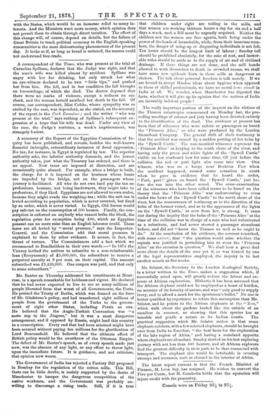The Government of India has rejected a Factory Bill proposed
in Bombay for the regulation of the cotton mills. This Bill, there can be little doubt, is mainly supported by the desire of Manchester to hamper the dangerous competition of the native workmen, and the Government was probably un- willing to discourage a rising trade. Still, if it is true
that children under eight are toiling in the mills, and that women are working thirteen hours a day for six and a half days a week, such a Bill must be urgently required. Neither the children nor the women are free agents, both being under the power of the heads of households, while, from their immense num- bers, the danger of using-up or disgusting individuals is not felt. Ten hours should be the longest limit of labour ; Sunday toil should be prohibited absolutely, for the sake of rest, and inexor- able rules should be made as to the supply of air and of civilised drainage. If these things are not done, and the mill hands allowed to work themselves to death in crowded rooms, we shall have some new epidemic born in these mills as dangerous as cholera. The talk about personal freedom is talk merely. If we are bound to accept Hindoo ideas about hygiene when opposed to those of skilled professionals, we have no moral locus stand( in India at all. We wonder, when Manchester has digested the facts, whether it will give up its opinion that the natives of India are incurably indolent people ?






























 Previous page
Previous page